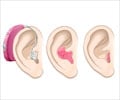
The most recent study was inspired by an ongoing survey tracking health outcomes of older residents from the Blue Mountains region of NSW, said Dr Schneider, who will present her findings to the Academy of Ophthalmology (APAO) Congress next week.
The Blue Mountains survey, headed by Professor Paul Mitchell, found six percent of the population suffered from dual sensory impairment (DSI), and the numbers increased sharply with age, with one in three (36 percent) participants 85 years and older experiencing dual vision and hearing loss.
"We know from research that people suffering from DSI are more likely to show communication problems and isolation, poorer health, less independence and more depressive symptoms than those with single sensory impairment or no impairments," Dr Schneider said.
In the most recent study, Dr Schneider and colleagues recruited 125 clients over 65 who attended vision clinics to also have their hearing loss assessed. "Three quarters of participants reported they had sought help for hearing loss in the past and approximately half owned hearing aids as a result," according to Dr Schneider.
"Less than two thirds of people with a hearing aid were using it regularly, while 35 percent reported not wearing them, and a further eight percent reported wearing them an average of one hour a week."
Advertisement
"Even if clients have attended hearing services in the past, they may have ongoing needs related to their hearing loss or dual loss, and many are not getting the best use from their hearing aids," she said.
Advertisement
Dr Schneider warned however that with 26 percent of the Australian population projected to be 65 years or older by 2050, over 1.1 million people (3.7 percent) are expected to have DSI.
Source-Medindia













